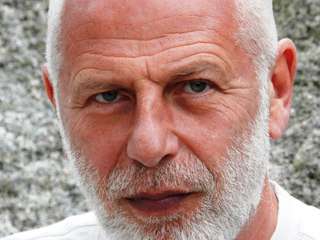|
Back
Spirits And Ghosts of an Alien Universe New York
Kaye Playhouse, Hunter College
07/23/2017 -
Johannes Brahms: Ballades, Opus 10 – Rhapsodies, Opus 79
Modest Mussorgsky: Pictures at an Exhibition
Vladimir Feltsman (Pianist)

V. Feltsman (© Courtesy of the Artist)
“I am a realist in the highest sense. That is, my business is to portray the soul of man in all its profundity.”
Modeste Mussorgsky (1839-1881)
Oh, the tragedy that Mussorgsky and Dostoyevsky–who died within one month of each other–never collaborated on either a song cycle or an opera. Not Brothers Karamazov or Crime and Punishment, those metaphysical morality plays. But the so physical, so visual damning Notes from the Underground or the searing House of the Dead. What these two artists–both mystics, esoteric Christ-believers, both so highly visual in their words and tones–might have created would have shaken the history of music.
(Though, granted, the intensities of both artists were so concentrated that they could have murdered each other in the process.)
What we do have from Mussorgsky are the operas (one towering, others intermittently good), the songs (my favorites), some salon piano music and of course Pictures at an Exhibition, which, when sung, narrated, chanted, exalted, glorified (let’s not use the prosaic “performed”) by Vladimir Feltsman becomes a thunderous paean to the composer himself.
And the performance yesterday afternoon from the sonorous aeries of Kaye Playhouse was something to either raise the hackles (of this listener) or raise the dead (for any Believers in the house).
First of all, this Pictures was not the warehouse of showoff techniques (à la Horowitz) or sentimental gallery-strolling or a recent performance by a matinee favorite who decided to erase the pictures and play a Russian-style Chopin
No, Moscow-born Vladimir Feltsman played like a painter of manic forces, unwilling or unable to hold back a visual tempest. Not that he rushed through the “gallery”. He could pause to hear the children in “The Tuileries” (not playing in unison but unpredictably stopping and starting). His “rich Jew” didn’t run along: he strolled, his pocket filled with gold ready to toss out to the musically sniveling “Poor Jew”.
Yet to prize this performance, one had to start with the very first notes, the “Promenade” phrases as popular, alas, as Strauss’s Zarathustra. Mr. Feltsman didn’t pause for an instant. His foot hardly leaving the pedal, he gave a quick stentorial call which somehow made us hear both an antique tromba, church bell resonances and piano.
It was a swift opening, whirling us without pause into the eerie “Gnomus”, and then into an “Old Castle”, which eschewed the usual tremolos and vibrato to give a gentle picture of Medieval life, perhaps that tune one which a troubadour would warble.
Now began the pictures with the “Promenade” between each one, and each “Promenade” varying with lilts, romance, and a tranquillo which positively pushed us into the surrealistic “Unhatched Chicks” ballet-ette.
For the final movements, one had to think of Yefim Bronfman. I have never heard him play this, but could imagine the power behind every note. Vladimir Feltsman has that same power, but it is less muscular than sensitive, even in the “Baba Yaga” central section. The feeling is foreboding, but one feels the confidence that even in the “Catacombs”, the Latin graffiti would be a blessing from an unknown deity. Not Dostoyevsky’s earthly Christ, but a Greek Titan, as the final notes reprised the bells of his original “Promenade” and became both Apocalypse and Hosanna together.
For those who have experienced many a piano Pictures this season, Mr. Feltsman’s, yes, was Mussorgsky, and yes, was great piano playing. But most of all it was, in Mussorgsky’s own words, “the soul in all its profundity.”
(Mr. Feltsman’s encore was a fine Brahms Opus 118 A Major Intermezzo, which was both gorgeous and unnecessary.)
From the gorgeous to the ghoulish: New York’s weekend subway system, which gives new meaning to the word “chaos”. To be brief, I was headed to 67th Street when the subway stopped for a while, took a short diversion and I wound up in the Badlands of South Dakota.
Okay, a slight exaggeration, but I did miss the opening Brahms Ballade. A sin of omission mainly because Vladimir Feltsman, who has been performing publicly for half a century, is a master of all. And anyhow, the grotesquerie of the First Ballade was a minor reflection of Mussorgsky’s later grotesque visions.
The last three were vivid youthful pictures. The inner melody of the Third Ballade had an exotic richness (Mr. Feltsman uses that resonating pedal without any excuses.) The B Major Ballade was offered not with solemnity but with the care of a rhapsodic singer. The first Ballade had a story attached, but Mr. Feltsman played the final three as if narrating other tales.
That was early Brahms, and Mr. Feltsman’s second cycle, the Opus 79 Rhapsodies showed a different side of the composer and the pianist. These were neither narratives nor pictures at an exhibition. The successful composer at that point gave us classical forms which almost burst out with passion. Mr. Feltsman has, when necessary, absolute taste. His passion was contained, allowing the music, with its oh so subtle colorations, to sing for itself.
That was indeed gorgeous playing from a pianist who needs no idiosyncrasies to make his point. Yet when the music demanded, the ravishing, the eccentric, the Dostoyevskyan demonization and canonization–yes, Mussorgsky’s piece–Mr. Feltsman was both Demon and Saint, creating an oscillating alien universe.
Harry Rolnick
|